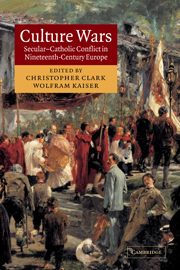Book contents
- Frontmatter
- Contents
- List of illustrations
- List of contributors
- Introduction: The European culture wars
- 1 The New Catholicism and the European culture wars
- 2 ‘Clericalism – that is our enemy!’: European anticlericalism and the culture wars
- 3 ‘Priest hits girl’: on the front line in the ‘war of the two Frances’
- 4 The battle for monasteries, cemeteries and schools: Belgium
- 5 Contested rituals and the battle for public space: the Netherlands
- 6 Nonconformity, clericalism and ‘Englishness’: the United Kingdom
- 7 The assault on the city of the Levites: Spain
- 8 Roma o morte: culture wars in Italy
- 9 Enemies at the gate: the Moabit Klostersturm and the Kulturkampf: Germany
- 10 Village quarrels and national controversies: Switzerland
- 11 The Counter-Reformation's last stand: Austria
- 12 The uncivil origins of civil marriage: Hungary
- Annotated bibliography
- Index
4 - The battle for monasteries, cemeteries and schools: Belgium
Published online by Cambridge University Press: 23 July 2009
- Frontmatter
- Contents
- List of illustrations
- List of contributors
- Introduction: The European culture wars
- 1 The New Catholicism and the European culture wars
- 2 ‘Clericalism – that is our enemy!’: European anticlericalism and the culture wars
- 3 ‘Priest hits girl’: on the front line in the ‘war of the two Frances’
- 4 The battle for monasteries, cemeteries and schools: Belgium
- 5 Contested rituals and the battle for public space: the Netherlands
- 6 Nonconformity, clericalism and ‘Englishness’: the United Kingdom
- 7 The assault on the city of the Levites: Spain
- 8 Roma o morte: culture wars in Italy
- 9 Enemies at the gate: the Moabit Klostersturm and the Kulturkampf: Germany
- 10 Village quarrels and national controversies: Switzerland
- 11 The Counter-Reformation's last stand: Austria
- 12 The uncivil origins of civil marriage: Hungary
- Annotated bibliography
- Index
Summary
The political and cultural history of Belgium has been characterised by three overlapping zones of tension: the relationship between capital and labour, the religious-philosophical divide and the language dispute between Flanders and francophone Belgium. Of these, the ‘religious-philosophical’ divide, which pitted Catholics against liberal secular free-thinkers, is considered the oldest. It was a feature above all of the nineteenth century, although its influence continued to be felt long after 1900. If the Catholic–secular cleavage ran deep into Belgian society, this was in part because it involved a contest between fundamentally opposed worldviews. Both Catholics and free-thinkers wished to see their respective visions imposed upon the public and private lives of the citizenry; both sought to equate their respective subcultures with the encompassing identity of the nation.
The Catholic model of society was based on religion, understood as the sacred reality of a higher truth. All other religions or convictions were considered aberrations that had no right to exist. It was the church's mission to lead people toward their supernatural destiny. It was thus important that there should be both solidarity and a structural bond between church and society. According to the pastoral logic of the church, a strong ecclesiastical power base was essential, since only Christian social structures would be able to produce good Catholics.
- Type
- Chapter
- Information
- Culture WarsSecular-Catholic Conflict in Nineteenth-Century Europe, pp. 102 - 128Publisher: Cambridge University PressPrint publication year: 2003
- 7
- Cited by



